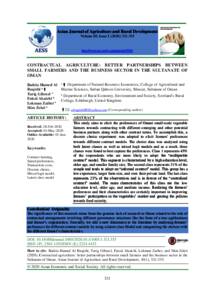وثيقة
Contractual agriculture : better partnerships between small farmers and the business sector in the Sultanate of Oman.
المعرف
DOI: 10.18488/journal.1005/2020.10.1/1005.1.321.335
المصدر
Asian Journal of Agriculture and Rural Development. v. 10, 1, p. 321-335
المساهمون
الدولة
Malaysia
الناشر
Asian Economic and Social Society.
ميلادي
2020-01-01
اللغة
الأنجليزية
الموضوع
الملخص الإنجليزي
This study aims to elicit the preferences of Omani small-scale vegetable farmers towards contracting with different emerging and other potential business partners along with other contract terms. To accomplish this, a discrete choice experiment was adopted to elicit farmers' preferences towards different contract models. The choice data was analyzed using both latent classes as well as mixed logit models and as a result, three classes were found to best capture the preferences. Class 1 represents 45% of the respondents who are more likely to adopt the “multipartite contract” model. This segment is characterized by a high education level, older age, and smaller family size. The second class represents 31% of the sample and tends to adopt an “informal contract” model. This group has a low experience, larger farm size, and own their private land. The last class represents 23% of the observations and is in favour of the “centralized contract” model. The main characteristics of this class are the low education level, older age, and medium income. Realizing the farmers’ preferences and their characteristics are certainly important in improving farmers’ participation in the vegetables’ market and gearing the policies towards food security.
ISSN
2304-1455
قالب العنصر
مقالات الدوريات

